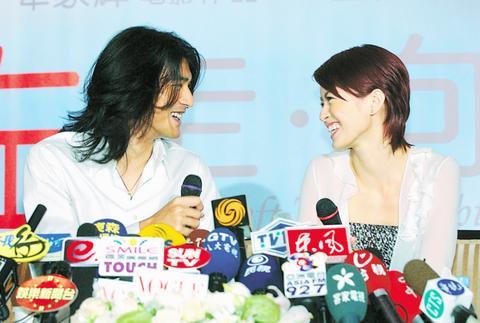After an exclusive report in Next Magazine last week (which was reported in Pop Stop) -- that claimed to have insider evidence that Hong Kong singer/actress Anita Mui (
Mui said the cancer hadn't spread and could most likely be successfully treated. But papers and magazines have expressed doubts about

whether the cancer has truly been detected early enough to treat and noted that she appears in public now wearing a hat, supposedly to cover up hair loss due to therapy and has already bought a burial site next to her sister. Another source of doubt is the fact that until Friday, Mui had vehemently denied what were then just rumors of her cancer.

Exhibiting denial of a different kind recently is Hsiao Hsien (
Speaking of abnormal activities, TV host Jacky Wu (
Lee Hom Wang (
This was apparently the week of unseemly passions, as former LA Boyz member and current UC Irvine med student Steve was spotted by local media involved in a rowdy public display of affection on Anhe Road last weekend. At the time he was wearing the muscle-accentuating wife-beater T-shirt that seems to make up his wardrobe's entire shirt collection.
To the chagrin of many women, Takeshi Kaneshiro (金城武) won't be indulging in any such tomfoolery because, according to the man himself, he?"doesn't have time for women" these days. In Taipei on Tuesday to promote his new movie Turn Left Turn Right in which he stars opposite Gigi Leung (梁詠琪), a reporter asked Takeshi if sparks had flown between him and Gigi, and if not, could sparks occur between him and the reporter. He responded with a devastatingly flat no to both questions.
Following up on a story from last week, Sun Yanzi (孫燕姿) and S.H.E. toasted each other at last weekend's Singapore Golden Melody Awards ceremony in a display of unity and friendship that they hoped would end the acrimony between their respective fans. S.H.E. fans have been calling for blood since Yanzi's album has been consistently outselling S.H.E.'s album that was released on the same day.

June 2 to June 8 Taiwan’s woodcutters believe that if they see even one speck of red in their cooked rice, no matter how small, an accident is going to happen. Peng Chin-tian (彭錦田) swears that this has proven to be true at every stop during his decades-long career in the logging industry. Along with mining, timber harvesting was once considered the most dangerous profession in Taiwan. Not only were mishaps common during all stages of processing, it was difficult to transport the injured to get medical treatment. Many died during the arduous journey. Peng recounts some of his accidents in

“Why does Taiwan identity decline?”a group of researchers lead by University of Nevada political scientist Austin Wang (王宏恩) asked in a recent paper. After all, it is not difficult to explain the rise in Taiwanese identity after the early 1990s. But no model predicted its decline during the 2016-2018 period, they say. After testing various alternative explanations, Wang et al argue that the fall-off in Taiwanese identity during that period is related to voter hedging based on the performance of the Democratic Progressive Party (DPP). Since the DPP is perceived as the guardian of Taiwan identity, when it performs well,

The Taiwan People’s Party (TPP) on May 18 held a rally in Taichung to mark the anniversary of President William Lai’s (賴清德) inauguration on May 20. The title of the rally could be loosely translated to “May 18 recall fraudulent goods” (518退貨ㄌㄨㄚˋ!). Unlike in English, where the terms are the same, “recall” (退貨) in this context refers to product recalls due to damaged, defective or fraudulent merchandise, not the political recalls (罷免) currently dominating the headlines. I attended the rally to determine if the impression was correct that the TPP under party Chairman Huang Kuo-Chang (黃國昌) had little of a

A short walk beneath the dense Amazon canopy, the forest abruptly opens up. Fallen logs are rotting, the trees grow sparser and the temperature rises in places sunlight hits the ground. This is what 24 years of severe drought looks like in the world’s largest rainforest. But this patch of degraded forest, about the size of a soccer field, is a scientific experiment. Launched in 2000 by Brazilian and British scientists, Esecaflor — short for “Forest Drought Study Project” in Portuguese — set out to simulate a future in which the changing climate could deplete the Amazon of rainfall. It is